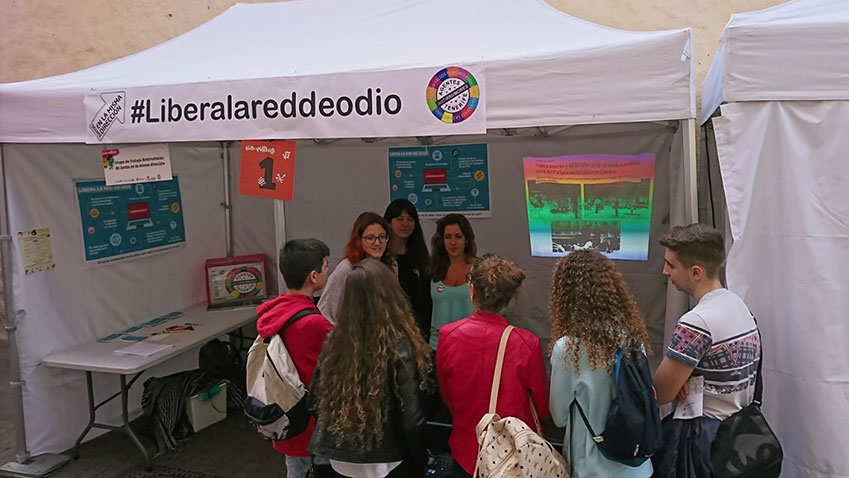Set-up under the cultural diversity management strategy “Together in the same direction” of the Island Council of Tenerife, the Tenerife Antirumours Group has just launched a new awareness-raising campaign to counter cyber-racism and intolerance spreading out through the internet and social media. Under the slogan, #Liberalareddeodio (free the net from hate), this campaign aims at raising awareness on the risks and prejudices deriving from the spreading online of hate speech and intolerance. The campaign will implement several awareness actions on social media, in the streets and in schools.
It is worth recalling that the initiative “Together in the same direction” is promoted by the insular Area of Employement, Commerce, Industry and Social-economic Development, along with La Laguna University thorough its General Foundation and the Migration Observatory of Tenerife, Obiten.
The actions of this new campaign will target online racism, which stands out for being more dangerous, faster and immediate, persisting in time and having a greater impact and scope. Another important feature of this type of racism is the misinformation about the consequences of the spreading online of hate speech against specific individuals or groups, which worsens the coexistence in a diverse and intercultural society such as Tenerife.
The councillor for Employment, Commerce, Industry and Social-economic Development of the Insular Council of Tenerife, Mr. Efraín Medina, stressed “the great work done by this Group, made up of people that devoted their time and efforts on a voluntary basis to fight against such major threats as hate speech, something we all see and may suffer online and against which we cannot turn a blind eye. These actions are extremely needed to show that everybody can act to counter and stop those intolerant and xenophobic speeches which bring such a harm to our society”.
The volunteers, part of the Tenerife Antirumours Group have already carried out a first awareness-raising activity in the framework of the “4th Canarian Islands’ Festival of the scientific and professional fields”, organised by the La Laguna University. Topics of discussion with secondary school and baccalaureate students from 5 metropolitan areas were the attitudes and behaviours that spread on social networks, and the dangers deriving from the cyber-racism.
In addition, the Tenerife Anti-rumours Group has also visited the French secondary school Jules Verne offering a workshop to those students attending grade 4th on the occasion of the Week against Racism. The follow up to this visit is to continue developing similar workshops in other schools of the Island, thus expanding the outreach of the awareness-raising campaign. Within the framework of this strategy, the idea is also to create a space for dialogue and “communication empowerment” through workshops addressed specifically to students attending programs of Training and Apprenticeship (Pfae).
The deputy president of Relations with the society of La Laguna University, Mr Francisco García, stressed "the importance of focusing on issues such as cyber-racism, as this is a problem that is becoming increasingly important in our society and that may have a particular impact on young people. One of the main goals of the University is to educate people to make them more and more tolerant and respectful, and these kinds of actions are in accordance with it. "
The “Antirumour Strategy for the prevention of racism” was a project promoted by the ACSAR Foundation in Barcelona and the Spanish Network of Intercultural Cities (RECI), that Tenerife started to implement in 2013 with the support of the City Hall and the La Laguna University, through the Tenerife Observatory of Immigration (Obiten). This initiative has also been launched in cities such as Bilbao, Sabadell, Fuenlabrada or Getxo; it was conceived with the aim of promoting and consolidating a long-term communication and awareness-raising strategy to counter negative stereotypes, commonplace and false rumours that circulate among the citizens about immigrants and cultural diversity, making coexistence difficult and leading to discriminatory and racist attitudes.




